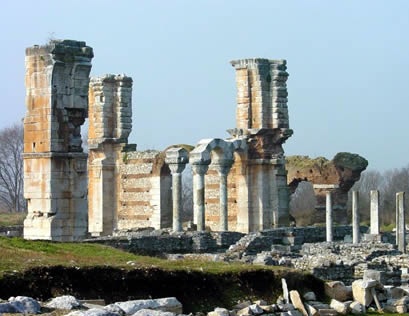 We come in the Book of Acts to Paul’s sailing across the Aegean to Greece, where he sets up missional shop in Philippi, and we found a picture from a 6th Century church there.
We come in the Book of Acts to Paul’s sailing across the Aegean to Greece, where he sets up missional shop in Philippi, and we found a picture from a 6th Century church there.
Anyway, because they knew that synagogues are near living/running water, they went to the river in the hope of finding a synagogue or, a very common name for such, a “house of prayer.” They encounter a woman named Lydia. She is described as a “God-fearer,” which is a term for a Gentile who embraced at some level the Torah and the people of God and the worship of Israel’s God. She is a trader in purple, which may or may not indicate wealth. No husband is mentioned, which may or may not indicate something about her marital status.
16:11 We put out to sea from Troas and sailed a straight course to Samothrace, the next day to Neapolis, 16:12 and from there to Philippi, which is a leading city of that district of Macedonia, a Roman colony. We stayed in this city for some days. 16:13 On the Sabbath day we went outside the city gate to the side of the river, where we thought there would be a place of prayer, and we sat down and began to speak to the women who had assembled there. 16:14 A woman named Lydia, a dealer in purple cloth from the city of Thyatira, a God-fearing woman, listened to us. The Lord opened her heart to respond to what Paul was saying. 16:15 After she and her household were baptized, she urged us, “If you consider me to be a believer in the Lord, come and stay in my house.” And she persuaded us.
The missional work of God involves the most unlikely of people responding, the most spontaneous of movements occurring, and the need for genuine missional people to flex with what God is doing. By the way, no Man of Macedonia appears; instead of encountering a man, Paul and the missioners encounter a woman.
What jumps from this text is how Lydia responded: The Lord opened her heart. Here Luke makes it clear that God is at work and she responded to the gospel because God moved in her to respond.
She got baptized and then compelled Paul and Silas and the author of the “we” sections of Acts (Luke?) to accept hospitality from her. Her appeal was that if they considered her a believer — a marginal participant in synagogue life who was now coming to faith in Messiah — then they should stay with her.
 We come in the Book of Acts to Paul’s sailing across the Aegean to Greece, where he sets up missional shop in Philippi, and we found a picture from a 6th Century church there.
We come in the Book of Acts to Paul’s sailing across the Aegean to Greece, where he sets up missional shop in Philippi, and we found a picture from a 6th Century church there.
